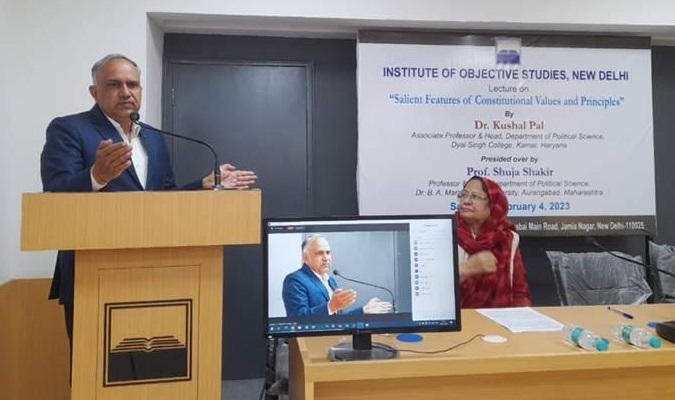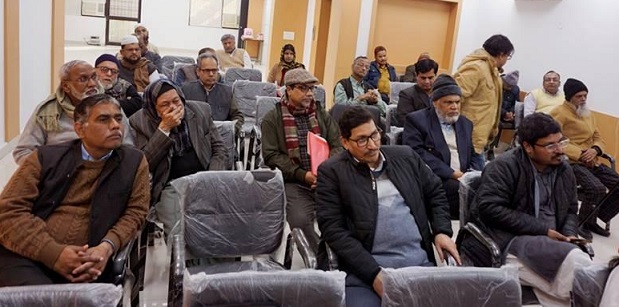IOS organises Lecture on “Salient Features of Constitutional Values and Principles”

Staff Reporter / New Delhi
“Indian Constitution has never been a rulebook, but it is more than what is perceived. It, instead, manifests transformation through constant evolution for the betterment of contemporary societies.” Said Dr. Kushal Pal, Associate Professor & Head, Department of Political Science, Dyal Singh College, Karnal, Haryana. Dr. Pal emphasized, “How socialist and secularism terms have been effectively used and evaluated in today’s democracy,” said.
He was giving a lecture on “Constitution, Democracy and Rule of Law in India” organised by the Institute of Objective Studies IOS on February 4, 2023 at Institute’s Auditorium here.
Dr. Kushal Pal, emphasised that in democracy diverse ethnic identities play vital roles. Democracy and Constitution should be understood and defined contextually as constitutional values are integral for every Indian citizen, he said.
Pointing out a caveat, Dr. Pal pointed out that a wrong perception of democracy exists in the Indian societies according to which democracy is an election exercise. In fact, democracy is a passage that empowers people for their overall participation in the growth path for which people must inculcate the habit of discussion, dissent, debate and decision-making. Participation was more important than voting—democracy needed to be understood in a broader context, he emphasised.
Another essential factor Dr. Pal spoke about was to make Indian democracy and Constitution even more vibrant. “Respect for minorities” for the success of democracy, public opinion, freedom of the press, freedom of judiciary and the separation of power is amongst the most crucial prerequisite for strengthening democratic values. He further said that India witnessed a multi-party system due to its exemplary growth of democratic ideals.
To bring awareness about the social system, Dr. Pal held that socialism was directly connected to the policies and programmes of respective governments. He gave an example of how Russian socialism proved a milestone as an alternative governance model and became a pathfinder for global empowerment wherever it followed. Several other developing countries followed Russia in due course of time with their specific restructuring and attained success.
Ironically, in the current Indian context, socialism was unfortunately limited to the Preamble only. The cause of global concern was that the world’s 1 percent population owned 40 percent of wealth. Such an imbalance devalued the meaning of socialism in the present era, he added.
Dr. Pal further stressed that in Indian context, the Constitution was a holy book for all—irrespective of everybody’s faiths and religious persuasions. It was because the philosophy and essentials of all religions were the same and oriented to human sustenance. The beauty of democracy was that secularism connected with federalism brought diversity and thus empowered the country rather than weakening it. In the familiar context, common masses loved and admired each other. Although certain political factors always tried to bring friction among them to destabilize the ascent of secularism, he observed.
The architect of the Indian Constitution, Dr. B.R. Ambedkar, had foreseen India’s amalgamation while drafting it. He ensured elaborate arrangements for the Constitution to sustain and strengthen over the period with scope for ensuring diversity having room for sustainable growth and empowerment, he noted.
Dr. Kushal Pal expressed the hope that India was autonomous with its internal and external policies due to its beautiful and accommodative Constitution. It sustained enduring values incorporated over time. Social justice was alive in India due to the masses and not due to political parties. Therefore, the role of conscious people became vital to ensure the overall growth of Indian societies.
In the closing remarks, Dr. Pal enlightened the audience that there is hardly any need for a population control programme. There was no relation between population growth and religion. Anybody who was well-educated and ensured of quality education would voluntarily contribute to the nation’s development. The governments must provide adequate educational facilities and healthcare for the masses to empower them for sustainability.
He concluded by shedding light on how print and social media in present India, played a constructive role in voicing the concerns of the masses, unlike electronic media with fast losing impact due to its portrayal of events in wrong ways.

Prof. Shuja Shakir, Professor & Head, Department of Political Science, Dr. B. A. Marathwada University, Aurangabad, Maharashtra, in his presidential address proposed a new resolution for social and constitutional empowerment of India. He endorsed the views expressed by the speaker that basic structure of India’s Constitution could not be altered as Justice, Socialism, Liberty are in its DNA, which hardly changed. He reminded everybody of how the British had created gap between the minority and majority communities for political gains in India.
The leaders today must advocate liberal pluralism. Ironically, there was a hue for corporate and capitalistic pluralism, which the British brought to damage Indian societies. He thanked the Institute of Objective Studies for organising this programme and congratulated Dr. Kushal Pal for delivering such an excellent lecture, which was followed by a lively Question-Answer session. He further emphasized that the worst phase was not permanent. If India encountered a politically biased trend today, it would no longer continue tomorrow as positive changes were bound to come.
Prof. Haseena Hashia, Asstt. Secretary General, IOS, welcomed guests with the introduction of Dr. Kushal Pal and Prof. Shuja Shakir. She thanked the audience present both offline and online, for their presence in the programme. She proposed a vote of thanks with the remark that such lectures were the need of the hour to empower Indian societies for advocating pluralism, socialism and secularism.
